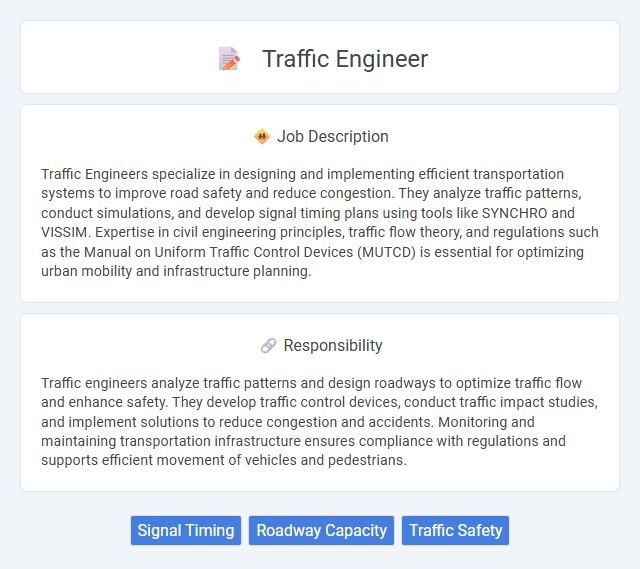
Traffic Engineers specialize in designing and implementing efficient transportation systems to improve road safety and reduce congestion. They analyze traffic patterns, conduct simulations, and develop signal timing plans using tools like SYNCHRO and VISSIM. Expertise in civil engineering principles, traffic flow theory, and regulations such as the Manual on Uniform Traffic Control Devices (MUTCD) is essential for optimizing urban mobility and infrastructure planning.
Individuals with strong analytical skills and a keen interest in urban planning are likely to thrive as traffic engineers. Those who enjoy problem-solving and working with data to improve transportation efficiency may find this role suitable. Candidates who prefer dynamic environments and collaboration with multiple stakeholders might also be well-matched for this profession.
Qualification
A Traffic Engineer typically requires a bachelor's degree in civil engineering or transportation engineering, with a strong foundation in traffic flow theory, road design, and traffic control devices. Professional Engineer (PE) licensure is often mandatory, alongside proficiency in traffic simulation software such as VISSIM or Synchro. Experience with traffic safety analysis, data collection, and local transportation regulations significantly enhances job qualifications.
Responsibility
Traffic engineers analyze traffic patterns and design roadways to optimize traffic flow and enhance safety. They develop traffic control devices, conduct traffic impact studies, and implement solutions to reduce congestion and accidents. Monitoring and maintaining transportation infrastructure ensures compliance with regulations and supports efficient movement of vehicles and pedestrians.
Benefit
Traffic engineers likely benefit from competitive salaries and opportunities for career advancement in urban planning and civil engineering sectors. They probably enjoy job stability due to increasing demand for efficient transportation systems and infrastructure improvements. The role may also offer intellectual rewards by solving complex problems related to traffic flow and safety.
Challenge
Traffic Engineer roles likely involve navigating complex urban infrastructures and managing congestion, making problem-solving a key challenge. Balancing safety, efficiency, and environmental impact may require innovative approaches to traffic flow optimization. Meeting regulatory requirements while adapting to emerging technologies in transportation could further complicate project execution.
Career Advancement
Traffic Engineer roles offer significant career advancement opportunities in transportation planning, infrastructure design, and traffic management systems. Professionals can progress from entry-level positions to senior engineer, project manager, or transportation planner roles by gaining expertise in traffic simulation software, data analytics, and regulatory compliance. Specialized certifications like Professional Traffic Operations Engineer (PTOE) enhance career growth prospects and increase eligibility for leadership positions within public agencies and private firms.
Key Terms
Signal Timing
Traffic engineers specializing in signal timing analyze traffic flow data and optimize traffic signal phases to reduce congestion and improve safety at intersections. Using advanced software tools like Synchro and VISSIM, they model traffic conditions and implement timing plans that enhance vehicle throughput and minimize delays. Their expertise directly impacts urban mobility by coordinating signal networks and integrating adaptive signal control technologies.
Roadway Capacity
Traffic engineers specializing in roadway capacity analyze traffic flow patterns, vehicle volume, and roadway design to optimize road network efficiency. Utilizing simulation tools and traffic modeling software, they assess current infrastructure limits and propose improvements to reduce congestion and enhance safety. Their work directly impacts urban mobility by determining lane requirements, signal timing, and capacity expansion projects that accommodate growing traffic demands.
Traffic Safety
Traffic engineers specializing in traffic safety analyze crash data and roadway conditions to design effective safety measures that reduce accidents and improve traffic flow. They implement traffic control devices, signal timing, and roadway geometry modifications based on data-driven assessments to enhance driver and pedestrian safety. Their expertise supports compliance with federal and state safety regulations, contributing to safer transportation networks.
 kuljobs.com
kuljobs.com